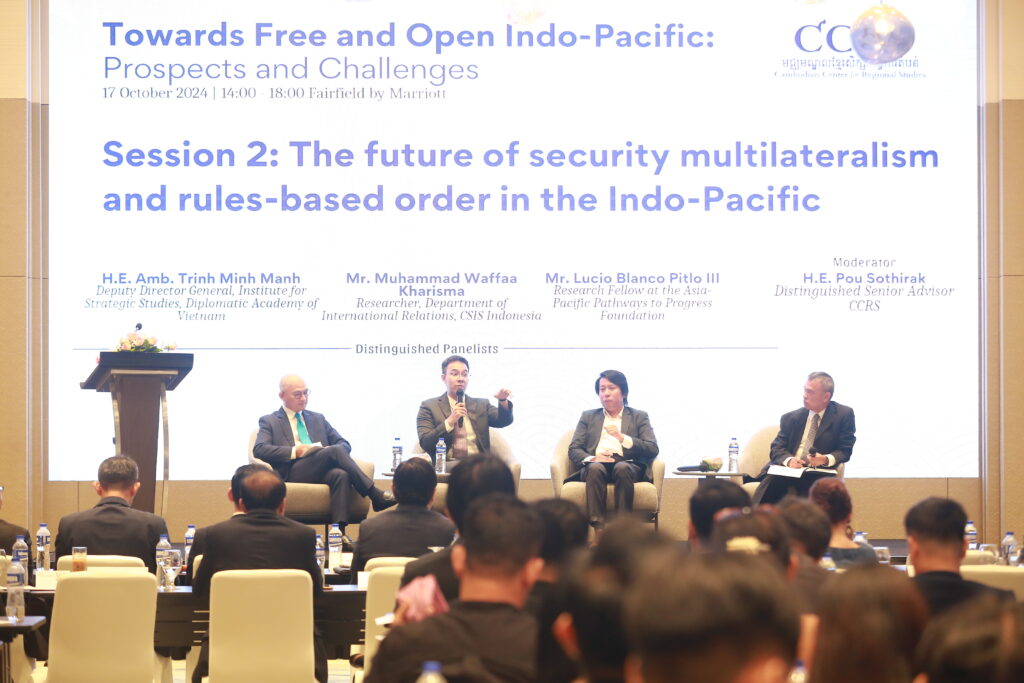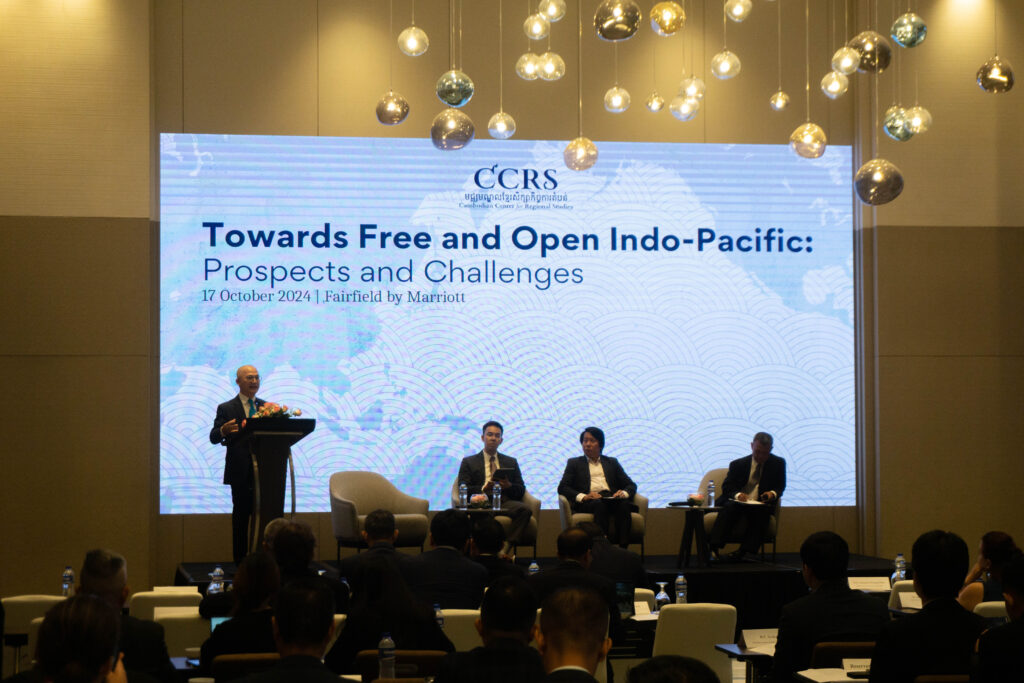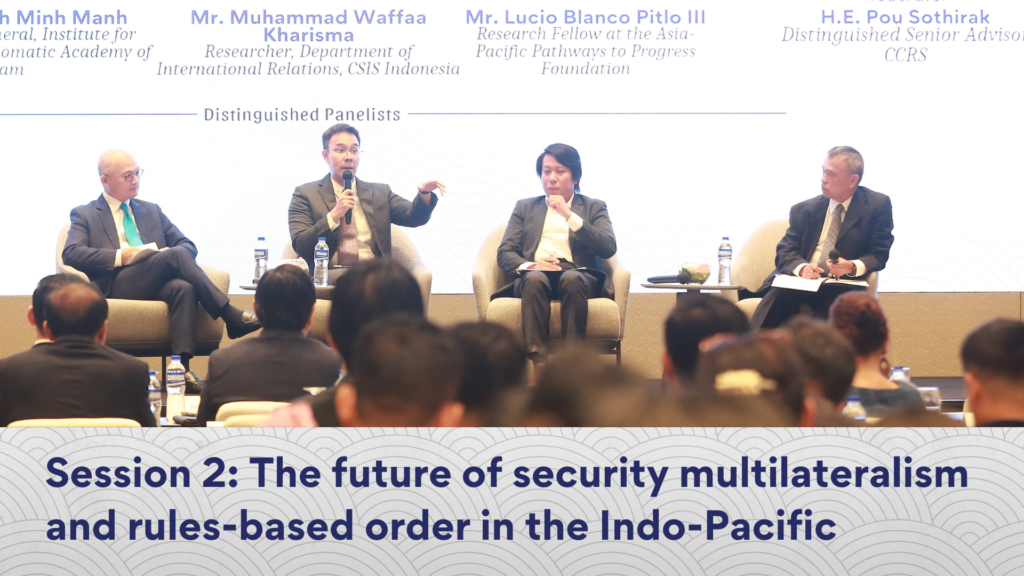
CCRS organized a regional seminar on “Towards Free and Open Indo-Pacific: Prospects and Challenges” on 17 October 2024. In the second session, there was a panel discussion on the future of security multilateralism and rules-based order in the Indo-Pacific.
Built on the previous session, the session delves into the central question of what kind of security multilateralism could warrant the rules-based order in the Indo-Pacific amidst looming geostrategic competition and uncertainty. This session also discusses competing views underscoring various minilateral and multilateral initiatives and assesses their performance about the relevance and changing contours of emerging economic and security architectures that undergird the overall effectiveness in securing rule-based order in the Indo-Pacific region.
This session was moderated by CCRS Distinguished Senior Advisor, Amb. Pou Sothirak. Three eminent speakers include:
– Amb. Trinh Minh Manh, Deputy Director General, Institute for Foreign Policy and Strategic Studies, Diplomatic Academy of Vietnam
– Mr. Lucio Blanco Pitlo III, Research Fellow at the Asia-Pacific Pathways to Progress
– Mr. Muhammad Waffaa Kharisma, Researcher, Department of International Relations, Centre for Strategic and International Studies (CSIS) Indonesia
Synopses of Presentations by Distinguished Speakers
ASEAN and the future of security multilateralism
Amb. Trinh Minh Manh, Deputy Director General, Institute for Foreign Policy and Strategic Studies, Diplomatic Academy of Vietnam (DAV)
The presentation will focus on exploring how minilateral mechanisms in the Indo-Pacific region can complement ASEAN’s centrality rather than compete with ASEAN. The remarks will outline ASEAN’s unique objectives and successes in community-building, promoting regional peace, etc. The remarks will then analyze the main impact of minilateral mechanisms, emphasizing that they do not aim to mirror ASEAN’s function and may in fact strengthen ASEAN’s position by increasing China’s need to engage with the bloc. The speech will highlight how these mechanisms, while intensifying great power competition, also provide ASEAN with opportunities to enhance its convening power and promote ASEAN-led frameworks. The remarks will conclude by outlining key requirements for ASEAN to build bridges between itself and various multilateral mechanisms. It will stress the importance of leveraging aspects of these mechanisms that can contribute to ASEAN, such as QUAD’s initiatives in healthcare and disaster relief. The speech will emphasize the need for ASEAN to effectively implement its Outlook on the Indo-Pacific (AOIP), enhance the effectiveness of various ASEAN-led mechanims including but not limited to the ASEAN Regional Forum (ARF), the East Asia Summit (EAS), while maintaining healthy and balanced relationships with mechanisms like QUAD, SCO, BRICS, etc.

Can minilaterals push security multilateralism in the Indo-Pacific?
Mr. Lucio Blanco Pitlo III, Research Fellow, Asia-Pacific Pathways to Progress Foundation
With the growing competitive minilateralism in the Indo-Pacific, in this presentation, the speaker examines the characteristics of the minilaterals – whether these groups are the band-aid of the fixture of the security multilateralism in the region. The speaker begins by exploring the factors behind the emerging of minilateralism in the world and the region at the first place. Then, he will address the nature and structure of this concept in in the wider Indo-Pacific, and in ASEAN specifically. Later on, he will allude the implications of minilats and rules-based order in the Indo-Pacific and the future prospects of the minilateralism in the region.
The Future of Security Cooperation and Rules-Based Order in the Indo-Pacific: Perspective from Indonesia
Mr. Muhammad Waffaa Kharisma, Researcher, Department of International Relations,
Centre for Strategic and International Studies (CSIS) Indonesia
Mr. Muhammad Waffaa Kharisma examines the evolving landscape of security cooperation and the rules-based order in the Indo-Pacific, focusing on Indonesia’s perspective. The region faces rising geopolitical tensions, particularly driven by the US-China rivalry, which has amplified concerns over potential security crises from conflict and extended to concerns over countries’ economic security and vulnerabilities within global supply chains. Indonesia, like many Southeast Asian nations, navigates a complex environment where multilateral cooperation is undermined by increasing great power competition. ASEAN’s role in shaping the regional order is under strain as its institutional mechanisms struggle to respond to emerging challenges and the rise of minilateral initiatives. While ASEAN’s commitment to consensus and non-interference have been a stabilizing force, it also limits its ability to tackle urgent security and economic issues, further complicated by pragmatic national leaders who prioritize domestic agendas.
The growing reliance on minilateralism, particularly among like-minded states, risks sidelining ASEAN’s centrality in regional diplomacy. As Indonesia pushes for a recalibration of the global rules-based order to better reflect the interests of the Global South, this paper explores Indonesia’s strategic dilemmas, emphasizing its need to balance national interests with regional leadership amidst an increasingly fragmented Indo-Pacific.
Short Biographies of Distinguished Speakers
H.E. Amb. Trinh Minh Manh
Deputy Director General, Institute for Foreign Policy and Strategic Studies,
Diplomatic Academy of Vietnam
Ambassador Trinh Minh Manh is now acting as Deputy Director General of the Institute of Foreign Policy and Strategic Studies under the Diplomatic Academy of Vietnam (DAV). He is a career diplomat with rich experience, having worked for various Departments of the Ministry for Foreign Affairs of Vietnam (MOFA) since 2000, overseeing Vietnam-ASEAN relations and Vietnam-US relations, including the elevation of Vietnam-U.S. relations to a comprehensive partnership in 2013. Beyond that, he served as Ambassador Extraordinary and Plenipotentiary of the Socialist Republic of Vietnam to the State of Kuwait from 2017 to 2020, and was posted in Vietnam’s Embassy in the United States from 2007 to 2010. Ambassador Manh grew up in Hai Phong City, Vietnam. He graduated from the Institute for International Relations now renamed as the Diplomatic Academy of Vietnam.
Mr. Lucio Blanco Pitlo III
Research Fellow
Asia-Pacific Pathways to Progress Foundation
Lucio Blanco Pitlo III is a foreign policy and security analyst. He is the President of the Philippine Association for Chinese Studies and a Research Fellow at the Asia-Pacific Pathways to Progress Foundation. He was a Taiwan Fellow and a Visiting Scholar at the National Chengchi University Department of Diplomacy and Center for Foreign Policy Studies in Taipei. He was a lecturer at the Chinese Studies Program of the Ateneo de Manila University and the International Studies Department of the De La Salle University. Mr. Pitlo was formerly a technical assistant with the National Coast Watch Council Secretariat, now known as the Presidential Office for Maritime Concerns. He also served as a research associate and consultant for several projects on maritime issues and Philippine foreign policy. He obtained his Master of Laws from Peking University. His commentaries and analyses on Philippine security and foreign policy and Southeast Asian affairs appear in the South China Morning Post, China-US Focus, Asia Times, CSIS Asia Maritime Transparency Initiative, and The Diplomat.
Mr. Muhammad Waffaa Kharisma
Researcher, Department of International Relations,
CSIS Indonesia
Muhammad Waffaa Kharisma is a Researcher at Centre for Strategic and International Studies (CSIS) Jakarta, Indonesia. With CSIS, he has worked on a range of research topics on the intersection between geopolitics, sovereignty, and humanitarian issues, including the security dynamics of the Indo-Pacific, the role of ASEAN in regional geopolitics and humanitarian issues, Indonesian foreign policy, the geopolitics and foreign policy drivers around the Korean peninsula, the humanitarian situation in Myanmar, and Indonesia’s maritime security. His most recent works were published in ISPI Commentary, Indonesia at Melbourne, The Diplomat, and CSIS publications. He had a part time teaching stint in Universitas Indonesia on units including Theories of IR and International Politics, as well as a research stint with Bank Indonesia, where he assisted on research assessing the possible impacts of geopolitical and socio-economic changes to Indonesia’s economy. He graduated Master of Science from University of Bristol, United Kingdom.

